Brutal History and its Contemporary Ghosts
“Imagine that you and all your friends were participating in a revolution,” says Ricardo as we walk the late night streets of Santiago, Chile, at the height of summer. It’s the year 2015, it’s hot out, even at night time, but there’s a slight breeze and I’m keeping the best of company. Even with his graying stubble and glasses, it’s hard to tell Ricardo’s 65 years old by the spring in his step and his animated hands as he tells his stories. Ricardo has searching eyes, a sweet smile and infectious laugh. He grabs both my shoulders for emphasis and looks directly at me so he knows I’m paying attention and I understand his words:
“Look, gringo,” he says affectionately but deadly serious, “imagine that the president of your country is a socialist and he’s nationalized the land, the workers and students have joined forces, and for the first time ever the universities are free and people, the working people and the poor without money, are studying their own history. There’s an intellectual culture and excitement in the air, solidarity in the streets: people cooking food for each other, playing music and dancing. Workers are proud of their work, the art being made isn’t made to convince people to consume useless products, it’s to educate and build a new culture. There is an incredible hope for the future, for revolutions across the world. Now imagine that you’re a young man and you’re free to explore and grow and have adventures and be part of this growing world revolution.” His eyes narrow and he gets a pained expression on his brow:
“Then one day there’s an announcement that the military is taking over the country. You’re with all your comrades at the university waiting for the president, Salvador Allende, to arrive and give a speech to rally the people, but he never shows up: the military has bombed the presidential palace and killed him, rounded up everyone they could who protested and put them in detention centers! And that’s it: there’s a coup and it’s all over. This really happened, Sascha: I lived through it. September 11, 1973. The only reason I didn’t end up dead that day was that I was at a safe house down the street from the university. I was there that morning in the crowd and I left just before they took Victor Jara and all the others, brought them to the stadium. The bastards broke Victor’s his hands so he couldn’t play his guitar, broke his hands before murdering him and leaving him dead in the streets. But you already know that story.
“It was a nightmare I will never recover from. They killed 5000 of us and tortured many thousands more. The right wing military government turned this country back in time to the dark ages. They convinced themselves that they were doing God’s work, that the Communist’s and anyone working with them were devils, subhumans, savages. And that’s how they treated us. They put the entire country under curfew for 5 years! 5 years! Can you imagine? It killed the night life, it filled us with fear, it murdered the soul of the people. They caught me one night sneaking out during curfew and brought me to a camp and tortured me. They shot a bullet through my hand, the pain was unbelievable, it was almost amputated, but here it is, mangled, but I still have it. I’m lucky I’m alive to tell you this story, so many of my friends from that time are dead!”
The late night heat of Santiago suddenly feels unbearable, heavy with ghosts. We’re on the underground Metro now, airless in a fluorescent lit car, Roberto holding the metal pole with his mangled but usable hand, so much heat, just lots of people pressed up against each other in silence. We’re the only ones talking within earshot. I’m so grateful for this man’s company in this crazy city.
“And you want to know the worst thing?” He continues, with the edge of tears in his eyes, staring straight at me: “The worst thing about it all is that they killed all our best people. All the most creative and vibrant voices of our generation: the best organizers, the best artists, the freest souls: murdered, disappeared and broken. They killed the locos, Sascha! You know how you and your friends talk about—how do you call them—the ‘Mad Ones?’ That’s who they targeted and murdered. The wildest ones, the strongest personalities, the ones who would now get a mental diagnosis and be put on drugs, the ones who could never fit in anywhere else, the ones who couldn’t stand to live under fascism. They killed them, Sascha.”
Roberto laughs, and it’s the kind of genuine and deep laugh that you only earn from having lived through horror: “This society is schizophrenic, man, not us. Look at this locura: look how scared people are of each other on the streets! They did our best to turn the people into sheep and they did a good job, didn’t they? This country is like a shell of its former self: They imposed the same individualist model that you have in your country: the neoliberal Yanki culture where everyone’s out for themselves, a bunch of isolated souls looking out for their individual interests. Back when I was young they got people to turn each other in for being Communists, for being gay, for being against the government for whatever reason. If they saw a man walking down the street with long hair the police would hold him down and cut it off! I swear to you I watched it happen! The police carried scissors. If a woman was wearing a short dress they would make her cover up her legs or send her home. You were either a Man or a Woman in the eyes of the state, no deviation. Once, during a demonstration in the 80s they grabbed two young protestors, brought them around a corner, doused them in gasoline and set them on fire! That really happened! The mean spiritedness and brutality is beyond comprehension. Who could do such a thing? That is the locura of this society. And like so many others I lived though it to tell the tales.”
The Movement for Alternatives to Psychiatry
Ricardo is one of the elders in a young movement that’s working to change the psychiatric system. I’ve been invited to come speak at a two conference called Alternatives to Psychiatry. Most of the Chileans I’ve met know the history of the dictatorship from reading books about it. The movement, like my movement back home, has its roots in left wing politics: a critique of capitalism and big business. There’s a strong analysis of the relationship between biopsychiatry and neoliberalism — consumer culture and the mass use of pharmaceuticals to keep people drugged and silent. The situation in Chile is eerily similar to the US: huge amounts of the population are taking psychiatric drugs, the language they’re using to talk about their inner worlds is the same as the language people use in the US: “mental illnesses,” “chemical imbalances,” “medication non-compliance,” etc. It translates seamlessly into the broken individualist culture of Chile. And it comes, like so many other pieces of Chilean culture and politics, directly from the United States.
The next day I walk around with Juan Carlos and his partner Carolina. They invite me to breakfast at their tiny apartment; one room with a bed and a little kitchen. They’re young and struggling to pay rent like so many others. Juan Carlos is the main organizer of the Alternatives to Psychiatry Conference. He is so enthusiastic to talk about the movement that I have to constantly remind him to slow down cause I can’t understand his unfamiliar vocabulary. His bookshelf is full of spanish language copies of classic anti-psychiatry texts and rare editions of Alfredo Monfatt and other Latin American social psychologists. He gives me precious photocopies of books made in Mexico in the 70s from transcriptions of gatherings of people trying to create a new movement for community psychiatry which ended up crushed by neoliberalism and biopsychiatry, just like in the United States and Europe. The writing is powerful and it is from these words that he’s gotten the language of “Alternatives to Psychiatry.” Just like us, they understand that there’s no future in an “anti-psychiatry movement.” We have to move beyond and learn from the past. I am so moved and inspired by his force of vision at 27 years old, the same age I was when I started The Icarus Project.
Carolina and Juan Carlos and I visit his old university, the same university (which now has a different name) that Victor Jara was rounded up in and taken to be murdered. In the early 70s it was filled with Leftist professors and revolutionary popular culture. Juan Carlos says: “You see that spot right there? There’s a photo of Angela Davis with a huge afro visiting from the United States and speaking in 1972. This is where Fidel Castro came to speak when he visited from Cuba. This entire campus would be filled with people to hear Allende speak. When the Coup happened the military pulled out all the leftist professors and either killed them or deported them.” Carolina adds: “My mom was from a poor family and she was going to school here at the time. When the Coup happened she had to drop out because they started charging tuition and she couldn’t afford it. She was in her last year and never finished and we grew up poor. Like so many others, my mother had her dreams crushed by the dictatorship.”
After visiting the university we visited a hospital and school for public health named after Salvador Allende because he had been a practicing doctor at the hospital before he became president. There was a package waiting for us of printed manuals entitled “Manuel de Derechos en Salud Mental.” Juan Carlos was the coordinator of the project, a handsome 45 page booklet with a color cover. It looked very similar to some of the materials developed by our friends in the movement in the US from the National Empowerment Center and others who inhabit the space between SAMSHA and Mad in America. In fact, the language was strikingly similar.
I remember in Buenos Aires a few weeks earlier my compañiera Agustina telling me that the words “Usuarios” and “Ex Usuarios” came to replace “Pacientes” the same way that “Users” and “Ex Users” replaced “Patients” in the mental health movement in the US. “Users” as in “users of mental health services.” I’ve never been fond of the word “user” in english: it sounds cold, or like it’s referring to someone shooting dope; a “drug user.” But in spanish the word “usuario” actually sounds lush, the ‘u’ vowel is way sexier than then consonant ‘y’ sound of the ‘u’ in user. Also, the ‘r’ rolls off the tongue which is a distinctive characteristic of español. Somehow I have a much easier time identifying myself as a “usuario” than a “user.” It just sounds sexier. But I still hold onto my identity of having “regalos peligrosos” (dangerous gifts) with a wink and a smile.
The Encuentro
The Alternatives to Psychiatry Conference – or “Encuentro” (I’ve always liked the spanish word better because it has the same root as “encounter”) was by all accounts a roaring success.
Imagine, if you will, a leftist social center in the middle of Santiago, with posters and banners covering the walls, and about a hundred Chileans coming from the North and the South of the country (far away!) packed into a room at 9:30 in the morning, with me and my Chilean friend Happy Lee del Canto Sabag and a distinguished looking man named Carlos Peres Soto at the front giving a talk about the need for a new movement called “Alternatives to Psychiatry.” Professor Soto is a university physics professor and the author of at least 8 books, including his most recent “Una Nueva Antipsychiatria” (A New Anti-Psychiatry.) An articulate critic of the political system and it’s relationship to the pharmaceutical industry, he leveled measured critiques at the system and called for a movement to hold the government and industry accountable. I, in contrast, am the foreigner with the broken but enthusiastic spanish, telling stories about my community back home, our network of radical mental health support groups of artists and activists, and our visions for changing the world. Happy is my translator when I can’t remember how to say something I turn to her and she smile and tells me what to say.
 The two days are filled with powerful conversations, discussions of alternatives and popular health, experiences of usarios and ex usuarios, the human rights of those in the system, popular music, art and culture. There are lots of young people, a mix of usarios and psychologists, and, like our movement back home, it’s often hard to tell the difference. The entire conference is videotaped and recorded with audio. On the second day Happy and I facilitate a “Mapas Locos” (Mad Maps) workshop which was an amazing and exhausting experience for me: a big room full of people talking about their inner worlds publicly for the first time. “What are the things in your life that are most important to you?” “How do you know when you’re well? What does it feel like in your body? What does it look like in your actions?” So many voices, so many nods of recognition and smiles. It felt very familiar. It felt like planting a lot of seeds, a lot of future conversations. I had so many talks with strangers who were grateful that I had come from so far away. It was challenging at times to understand what people were saying to me. Somehow it was much easier after drinking a couple beers and relaxing. Saturday night there was a big party in the streets of Santiago, a holiday celebrating some old war between Peru and Bolivia. But it was beautiful: so much music and dancing in the streets, people selling art and food, reveling in the summertime, despite the legacy of so much repression. We were a big group drinking beer in the street. It felt really good to have the solidarity.
The two days are filled with powerful conversations, discussions of alternatives and popular health, experiences of usarios and ex usuarios, the human rights of those in the system, popular music, art and culture. There are lots of young people, a mix of usarios and psychologists, and, like our movement back home, it’s often hard to tell the difference. The entire conference is videotaped and recorded with audio. On the second day Happy and I facilitate a “Mapas Locos” (Mad Maps) workshop which was an amazing and exhausting experience for me: a big room full of people talking about their inner worlds publicly for the first time. “What are the things in your life that are most important to you?” “How do you know when you’re well? What does it feel like in your body? What does it look like in your actions?” So many voices, so many nods of recognition and smiles. It felt very familiar. It felt like planting a lot of seeds, a lot of future conversations. I had so many talks with strangers who were grateful that I had come from so far away. It was challenging at times to understand what people were saying to me. Somehow it was much easier after drinking a couple beers and relaxing. Saturday night there was a big party in the streets of Santiago, a holiday celebrating some old war between Peru and Bolivia. But it was beautiful: so much music and dancing in the streets, people selling art and food, reveling in the summertime, despite the legacy of so much repression. We were a big group drinking beer in the street. It felt really good to have the solidarity.
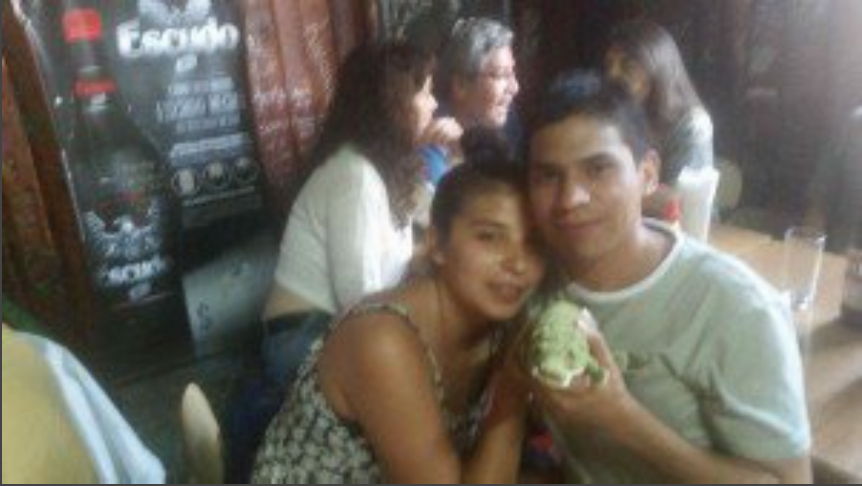
The Lesson to Bring Home
At some point, after a few days, amidst the heat of the city, and all the stories I had heard from my new friends, and my time riding the subways and the buses, looking into stranger’s eyes, looking at the familiar slick advertisements and chain stores everywhere, the palm trees planted to mimic the city of Miami, it hit me like a hard slap in the face: this country, Chile, this “economic miracle,” this “neoliberal experiment,” is the perfect way to explain everything that’s wrong with the biomedical model of “mental illness.”
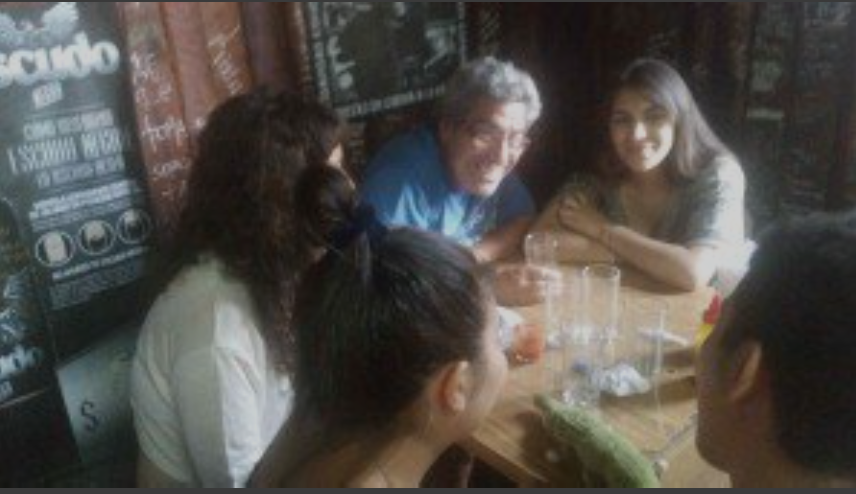
Where I live, back in the United States, it’s so common to use the language of “mental illness” to talk about people’s individual problems. We take it as a given, as some kind of scientific truth that if we are depressed, it is because we have a chemical imbalance in our brain. We assume that someone who is “schizophrenic” is so because of some genetic flaw. There is something wrong with our neurotransmitters, our personal biology, something that can be cured with a pill. But this is culture, not science. Even if some us are born more sensitive and different, and even if some of us use pills to take care of ourselves in this crazy world, that doesn’t make us “sick.” The whole idea of “sickness” comes from the culture we live in. And it’s a culture that has a political origin.
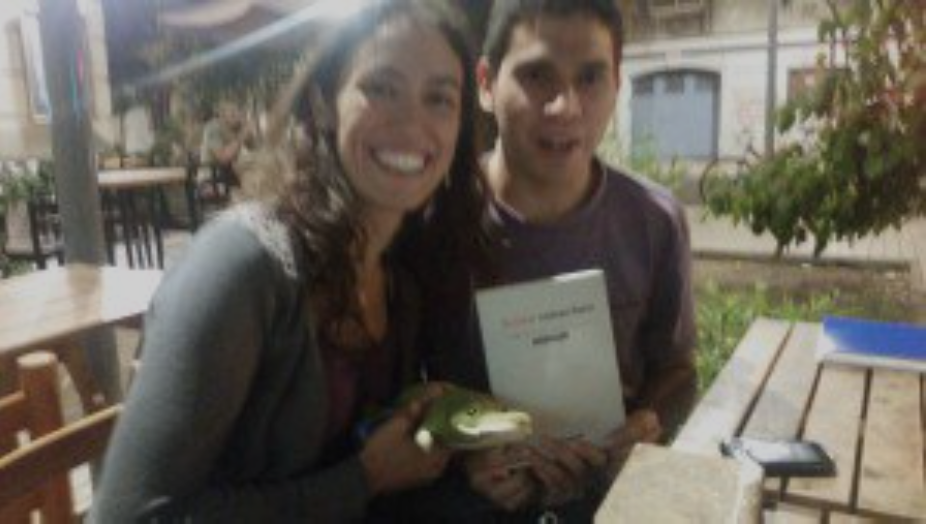
You can’t get a more stark example of how neoliberal politics and psychiatry work than in the country of Chile: these people had a socialist revolution that was crushed beyond recognition by a fascist dictatorship directly supported by the United States government, a solidarity among the people that was broken with bullets and torture and terror. All these years later they take just as many antidepressants and antipsychotics as we do, because their system has been designed after our system. They are told they are mentally ill and they believe it.
I left Chile with a burning desire in my heart to tell their story to my community back home. I think the story of the Chilean people rising up and being crushed and blatantly forced into an oppressive model of psychiatry is one of the pieces of the puzzle that is going to unlock the biopsychiatric riddle. We are human beings with history and politics and ideals of a better world. We need new language to talk about the complexities of intergenerational trauma. We need new language to talk about madness and oppression. We don’t need to become normalized into the system, the system we live under is pathological and psychotic.
There are more and more of us who are determined to build an international movement that doesn’t forget its history, and that reweaves solidarity and community back into a model of mental and emotional and spiritual health. The system we live under is organized to keep a small number of people in control of the rest of us. Those who don’t fit into the model are drugged and silenced. We — the Mad Ones, the ones who have no choice but to feel the suffering of this planet and the people on it — we have a responsibility to create a new world that can hold our visions and brilliance. We have a responsibility to know our own histories of oppression and resistance. We carry with us the memories of the dead, the tortured, the exiled, and the ones whose flames can never be extinguished. Like Martin Luther King Jr. prophesied before he was shot down: “Human Salvation Lies in the Hands of the Creatively Maladjusted.” We need to hold onto this vision as we continue to build our international movement.
Thanks to all the companier@s who looked out for me and came out to our Mapas Locos workshops in Buenos Aires, Argentina and Puerto Montt and Santiago, Chile over the past month. Your kindness and hospitality was so appreciated! Than you so much for sharing your stories and your hopes and your dreams with a passing traveler. Please stay in touch! Mad love!
* * * * *
This article first appeared on Sascha Dubrul’s website,
Maps to the Other Side


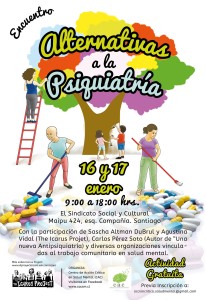
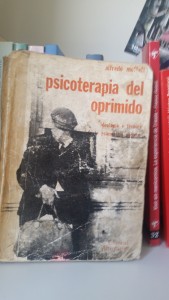
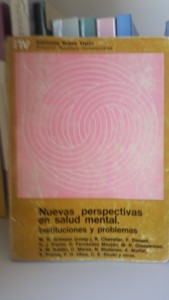

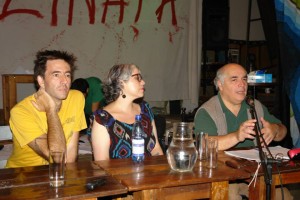
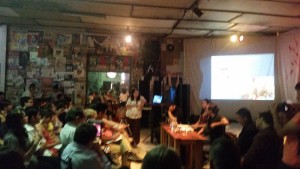
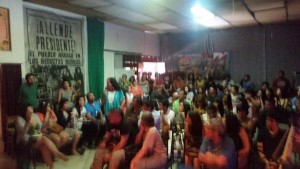
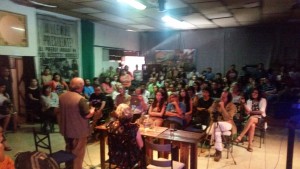











Thank you, Sascha. This is a very important story, and the way you tell it is beautiful and compelling. I’m so glad to see these links between the psyche and politics being made; it seems to me that without careful attention to both scales, the individual and the social, neither realm will come fully into realization or be safe and sustainable.
The connections you make reminded me of some recent works on addiction, which I think bears some similarities to “mental illness” (really, psychic distress) with regard to origins and how it is handled in our society. I read the other day a piece by Sarah Levine on addiction and climate change and making the case for building human and community connection as crucial to kicking our addiction to fossil fuels (ealitysandwich.com/248585/addiction-climate-change-and-the-psychology-of-recovery/). In other words, and I think in line with what you write, it’s not so much that there is something wrong with individuals, but rather that they are adapting however they can to an insane and harsh society and physical (automobile-depedent) environment, and so we need to build a better, more humane society and infrastructure–which perhaps is somewhat akin to the comaraderie you describe in both the pre-1973 social movement and in the alternative-psychiatry movement of today. In a similar vein, Johann Hari’s new book, “Chasing the scream: the first and last days of the war on drugs,” makes the case that chemical addictions stem most fundamentally from disconnection and isolation; “addiction” is not so much a chemical phenomenon in the brain as it is a desperate attempt to connect with SOMEthing beyond the pain of isolation. To that I would add Gabor Mate’s emphasis on trauma as a cause of addiction.
I wonder if you or anyone else here knows of, or is simply interested in, efforts to link alternatives-to-psychiatry not just to politics but also to other alternative health, healing, and environmental efforts. I think there may be some very interesting and important work to be done in this vein.
Report comment
p.s. None of that is to discount your point that a lot of what is now termed “mental illness” is actually healthy and vital creativity. In that respect I think there is a real difference between “mental illness” and addiction–not many addictions are healthy and creative. I suppose there are the Hemmingways and Bukowskis out there, but generally not so good.
Report comment
Thanks so much for your reply Danny. I think the recent conversations about addiction that are happening in the context of a traumatized society are rally important. These days there’s a pretty thriving community of folks writing that I think you would find of interest in our Facebook group (if you find yourself in the strange corporate world of facebook we’ve been inhabiting) https://www.facebook.com/groups/2394863930/?fref=nf
Thanks again for writing and appreciating my stories, they were powerful experiences for me to have and it feels really good to be able to share them.
Report comment
To whom are you referring when you use the word “us”?
Report comment
I asked myself this question as well. Certainly I am not one of these us. I also question whether there is still much space between SAMSHA and MIA. But, I did really enjoy this article.
Report comment
hey Sharon – I’m glad you appreciated the article!
Report comment
hey uprising! this is the “us” that i’m referring to:
http://www.theicarusproject.net/about-us/icarus-project-mission-statement
12 years and running
Report comment
Hey Sascha,
Thanks for the reply. I’d been under the impression that TIP membership was pretty diverse and actually included some folks who were anti-psychiatry, so that’s why I wasn’t sure who you were speaking about.
I should have said that I really liked the overall message of your article and think that it is very important, but that’s why the line about anti-psychiatry having no future sticks out to me like a sore thumb, especially since you then give a favorable mention to Dr. Soto, whose book is called “A New Anti-psychiatry.”
Why do you think there is no future in an anti-psychiatry movement? What exactly do you mean when you write: “We have to move beyond and learn from the past”?
Report comment
hey sharon and uprising and frank – it’s semantics really. i think defining oneself in opposition to something is an important first start but an intellectual dead end. and what is this “psychiatry” that we’re talking about anyway, ,considering the biopsych model looks really different than the freudian based model we had back in the day. is it the drugs? is that what we’re against? because if that’s the case, i’m disqualified because i take lithium every night and it’s really helpful for me. i think peter breggin is wrong has the potential foe being harmful when he talks about lithium as a “brain disabling agent” because some people have bad reactions to it. trust me, i would not be able to do everything i do every day with a “disabled brain.” i think “anti-psychotic” drugs can save people’s lives, and that they’re totally over prescribed and given to 8 year olds is not a function of the drugs but a function of capitalism.
all that said, i’m way more interested in building a movement FOR something then being part of a movement AGAINST something. if it was politically useful to use the term “anti-psychiatry” i would use it with no problem, but in my view its lost its power to engage people in a contemporary way. i apologize if that doesn’t sit will with where you sit. here’s more thoughts i wrote a couple years ago on alternative visions: http://www.madinamerica.com/2012/07/a-collective-human-potential-movement/
Report comment
Hmmm. Psychiatry is the field of endeavor which claims that it is dealing with “mental illness.” Whether it blames this on developmental or physiological causes, the primary fallacy it promotes is that a mind can be “diseased,” which is a linguistic impossibility given the standard definitions of “mind” and “disease.”
Would one prescribe drugs for a “sick” economy? It makes no less sense than prescribing them for a “sick” mind. (Szasz)
Report comment
I would disagree. Everything is not reducible to wordplay. We could, for instance, look at the meaning of the word lithium. However much we look at the meaning of the word lithium the substance lithium doesn’t cease being a drug, and having such effects as drugs are prone to have. There is more to non-compliance, my friend, than words. One could, too, be very gullible, and as a consequence suffer the fate of the duped, but that is not a merely a matter of semantics.
There are obviously fundamental differences of opinion at work here. Some people know better than to buy the “disease” pitch, some people don’t. When it comes to a bill of goods, there are other things I had rather possess. Control of my own body, my own person, and my own life happens to be one of them. Countering the violence and force of the state is a very positive thing in my eyes. I wouldn’t let the system crush me in the name of positivity.
People are dying. The system is killing them. Pretending that this is not so is a bad thing as far as I’m concerned.
Report comment
I am all for alternatives to psychiatry, and I think people who have talent or interest in that direction should work on them. But I certainly don’t think that the psychiatric profession and the “mental health” system are just going to stand there while they are replaced. Psychiatry has to have its power taken away, because they aren’t just going to throw up their hands and give up when we tell them about how we want things done. As for the concept of “anti-psychiatry” turning people off, I haven’t seen that, plus the concept is just finding its way out there.
Report comment
I take an orotate form of the *mineral* lithium, in small amounts.
It is not a drug, it’s a *mineral* – naturally occurring in some foods and in our brains. It helps me tremendously:
http://www.thelithiumdoctor.com/
I agree – being against something is not enough.
I consider myself *pro* wellness, *pro* recovery, and *pro* freedom (not necessarily in that order).
I will refrain from any further comments; taking a break for a while from commenting (debating, arguing) on MIA for my own sanity (and the sanity of others?), but felt the need to let readers know of the benefits of lithium orotate.
Be well,
Duane
http://discoverandrecover.wordpress.com/nutrition
Report comment
To clarify, lithium is a naturally-occuring *mineral* – one which is *required* by the body, especially the brain, in trace amounts to properly function.
If you eat tomatoes, you take the so-called “drug”, lithium. And lithium is in your brain. It needs to be there to work right. The link above is a good *starting* point.
Duane
Report comment
Okay, Duane, if you really want to go there, whatever lithium is it has an effect on the mind and the body, and much more of an effect than the word lithium ever will. I was forced to take lithium while in the hospital, and it caused hypothyroidism in me. I was given another drug for the hypothyroidism. I wouldn’t really advise taking lithium as a rule. It isn’t naturally occurring in the human body in any significant amount, and if you refer to the adverse effects (under misnomer subheading “side effects”) listed on the Wikipedia page on the subject, the dangers so listed are bound to give anybody reading them a long pause.
http://en.wikipedia.org/wiki/Lithium_%28medication%29
Report comment
Frank,
Sorry to hear of your rx lithium-induced thyroid condition.
Unfortunately, this is quite common when a person is put on prescription lithium, in doses that are just below the toxic level. Far too often, toxicity occurs.
I am talking about very small amounts of lithium orotate (not lithium carbonate as a prescription in large doses, but lithium orotate as a supplement in very small amts). I’m fully aware of the negative publicity about this (including Wikipedia, which I often take with a grain of salt).
I am talking about something different – small doses, as a supplement. Done this way, lithium orotate can be helpful to the brain:
http://blog.drgina.com/2013/02/26/lithium-protects-the-brain/
It was not my intent to get into a long debate on the subject; only to point out to readers interested where to find out more about this subject. I’ve taken it for years, with no problems. Many others, as well.
The last word is yours (if you want).
Duane
Report comment
I would love to see a new term and concept replace “anti-psychiatry.” Personally I have seen many people who identify as such say it means many completely different things. One of my favorite definitions was by someone who said that a) psychiatry had saved her life and she was incredibly grateful, but b) she was just so tired of all the bullshit. It does turn a whole lot of people off, people who choose to accept psychiatric treatment and find it helpful or lifesaving, and really don’t appreciate being “antied.” Really love this article, it has a lot to say about a very complex, complicated issue.
Report comment
Cataract,
If people feel “antied” by the anti-psychiatry perspective because they accept psychiatric “treatment” and find it helpful, that reflects a lack of understanding about what anti-psychiatry is about. And that’s perfectly understandable, because psychiatric PR loves to portray the anti-psychiatry perspective as being ableist and “anti-patient.” It loves to create a siege mentality that makes psychiatric “patients” identify with psychiatry. But none of that reflects what the actually existing anti-psychiatry perspective is about. I’m open to discussing the drawbacks of organizing around the term “anti-psychiatry,” and I think its important to consider that there is widespread misunderstanding of the term, but I don’t want to play psychiatry’s PR game.
Report comment
Ditto to Uprising & Sharon’s questions.
Otherwise, great article.
Report comment
As long as freedom of choice means anything so will anti-psychiatry. I, for one, am gratefully free of psychiatry and psychiatrists. Call me liberated. Anti-psychiatry, as far as I can make out, seems a heck of a lot healthier than psychiatry. Treatment, as you may have noticed, if you noticed, can kill. Non-treatment, on the other hand, never hurt anybody.
When, with all the good intentions in the world, given psychiatry, “help” winds up meaning harm. I’d be a fool to do otherwise.
Report comment
Sascha, I have great respect for you, but I think saying that Icarus has “evolved” beyond an anti-psychiatry position is pretty disrespectful of those of us who would not use the word “evolved”against people we disagree with. I don’t think Icarus ever did call itself anti-psychiatry.
Having said that, I am very interested in whatever ideas Icarus has come up with that would be good alternatives to psychiatry in your opinion. Maybe I could get involved with them in some way.
Report comment
Thanks for this piece, Sascha-more people need to made aware of this ‘history’ and connect the dots. As the old saying goes, ‘the personal is political…’
Report comment
Speaking of Latin America and alternatives, one Bruce Levine and Noam Chomsky’s favorite psychotherapist was a Salvadoran. His name eludes me.
Report comment
word. thanks for mentioning him.
http://brucelevine.net/liberation-psychology/
“Ignacio Martin-Baró (1942–1989) was both a priest and a psychologist, and it is he who should be given credit for popularizing the term liberation psychology. Martin-Baró’s liberation theology, liberation psychology, and activism for the people of El Salvador cost him his life. In the middle of the night on November 16, 1989, Martin-Baró, together with five colleagues, their housekeeper, and her teenage daughter, were forced out to a courtyard on the campus of Universidad Centroamericana José Simeón Cañas, where they were murdered by the US-trained troops of the Salvadoran government’s elite Atlacatl Battalion.”
Report comment
thanks humanbeing.
Report comment
Sascha,
This is a fantastic, gripping and hard hitting story that does really connect the dots of the monstrous cannibalistic global Big Pharma/Corporate and political agendas using psychiatry as a means of brutal social control and enabling fascist totalitarian governments to rob people of all their civil, human, democratic rights in the guise of mental health especially against dissidents exposing or protesting these brutal government/corporate dictatorships as did Stalinist Russia emulated by the U.S., the UK and other so called democracies in modern times.
The great book and web site, Political Ponerology, explains this psychopathic micro and macro hijacking of decent people and governments/organizations via infiltration, manipulation and ultimate totalitarian control as with Nazi Germany, Stalinist Russia, etc. The author working under such a dictatorship himself while secretly writing this work and trying to get it to influential people to no avail ultimately got it published under great duress in the U.S. to warn others of this psychopathic menace to humanity unless they wake up to their nefarious goals and tactics. Unfortunately, he warns that psychopaths manage to infiltrate and hijack governments during good times when people get too lax until the guaranteed bad times come thanks to the ultimate cruel psychopathic inhumane agendas which require people to wake up and use their growing suffering to fight and take back their power and governments as with Nazi Germany, etc. Dr. Robert Hare, world authority on psychopaths and consultant to the FBI, also exposes how much human evil and suffering is inflicted on humanity by these intraspecies predators in his books, Without Conscience and Snakes in Suits: When Pychopaths Go to Work based on the classic book, The Mask of Sanity by Dr. Hervey Cleckley. Dr. Hare created the PCL-R or test for identifying psychopaths, another name for evil, sadistic, predatory people well described in the works of major world religions.
Thanks for sharing this with us.
Report comment
“This society is schizophrenic, man…”
Probably the most concise and articulate truth I’ve read on MIA, or anywhere, ever.
Report comment
🙂
Report comment
“I lived through it. September 11, 1973.” I lived through it. September 11, 2001. The similarities are not likely coincidences, are they? I was a US artist attacked, via psychiatric stigmatization, tranquilization and poisoning … for thinking 9.11 was disgusting. US citizens who think 9.11 was disgusting are “mentally ill?” So says bio psychiatry, who’s crazy?
Fabulous article, thank you. And I agree, we seem to have the beast in charge right now. God help us.
Report comment
hey sascha
i just want to tell you i like the article and the stories are really inspirational
thank you
Report comment
Hey Sascha,
I’m responding to your reply to me (and others) above, but I moved down here as the space to comment had run out up there…
Since you mentioned Peter Breggin in the course of talking about anti-psychiatry, I think it should be pointed out that he doesn’t identify as being anti-psychiatry (because of its use as an epithet by psychiatry’s key opinion leaders, I believe). I don’t know what he has said specifically about lithium, but I have heard him say that all psychiatric drugs work by disabling the brain. I don’t think that’s a judgment about whether or not they bring a feeling of relief to the person taking them, but I do think it’s in line with the available evidence. He’s not saying that they don’t sometimes “work” for some people in a subjective sense.
To answer your question, the psychiatry that I am against is the one that seeks to treat metaphorical illnesses with questionable, dangerous physical interventions and which functions as a coercive and unaccountable agent of social control – and is therefore an illegitimate medical specialty (regardless of whether it is draped in Freudian trappings or is trying to impersonate neuroscience). There is no inherent judgment in that about how any individual chooses to cope. There is a judgment that drugs should not be forced on anyone, and that psychiatric drugs should not be considered medicines in the same way that insulin is considered medicine, but anti-psychiatry as I understand it is not necessarily synonymous with “anti-drug,” as many people seem to think.
I don’t know if I would say that neuroleptics save people’s lives, given the serious long term problems and early deaths they are known to cause. It is true that a person in “psychosis” can sometimes be tranquilized out of it by those drugs, and some individuals may find that worth the risk (just as someone might find lithium worth the risk), but that is not the same thing as saying they are meds “like insulin for diabetes” (and by the way, I’m not suggesting that you personally believe that). In fact, when one considers the phenomenon of drug induced super-sensitivity psychosis, neuroleptics may be the invisible bars that keep a lot of people in a prison of sickness for life (if not in a literal prison). So I think that people who are currently taking psychiatric drugs have as much, if not more, reason to be anti-psychiatry as anyone else.
It may be that we must agree to disagree on some or all of this, and that’s okay from where I sit, but I’m really glad this topic came up. I would highly recommend the following two articles by Bonnie Burstow, which are my “go-to” links for anti-psychiatry and can give you a sense of where I’m coming from here:
http://www.madinamerica.com/2014/10/antipsychiatry-revisited-toward-greater-clarity/
and
http://bizomadness.blogspot.ca/2014/07/on-antipsychiatry.html.
Report comment
Beautiful article.
“It is no measure of health to be well adjusted to a profoundly sick society.” – Jiddu Krishnamurti
Report comment